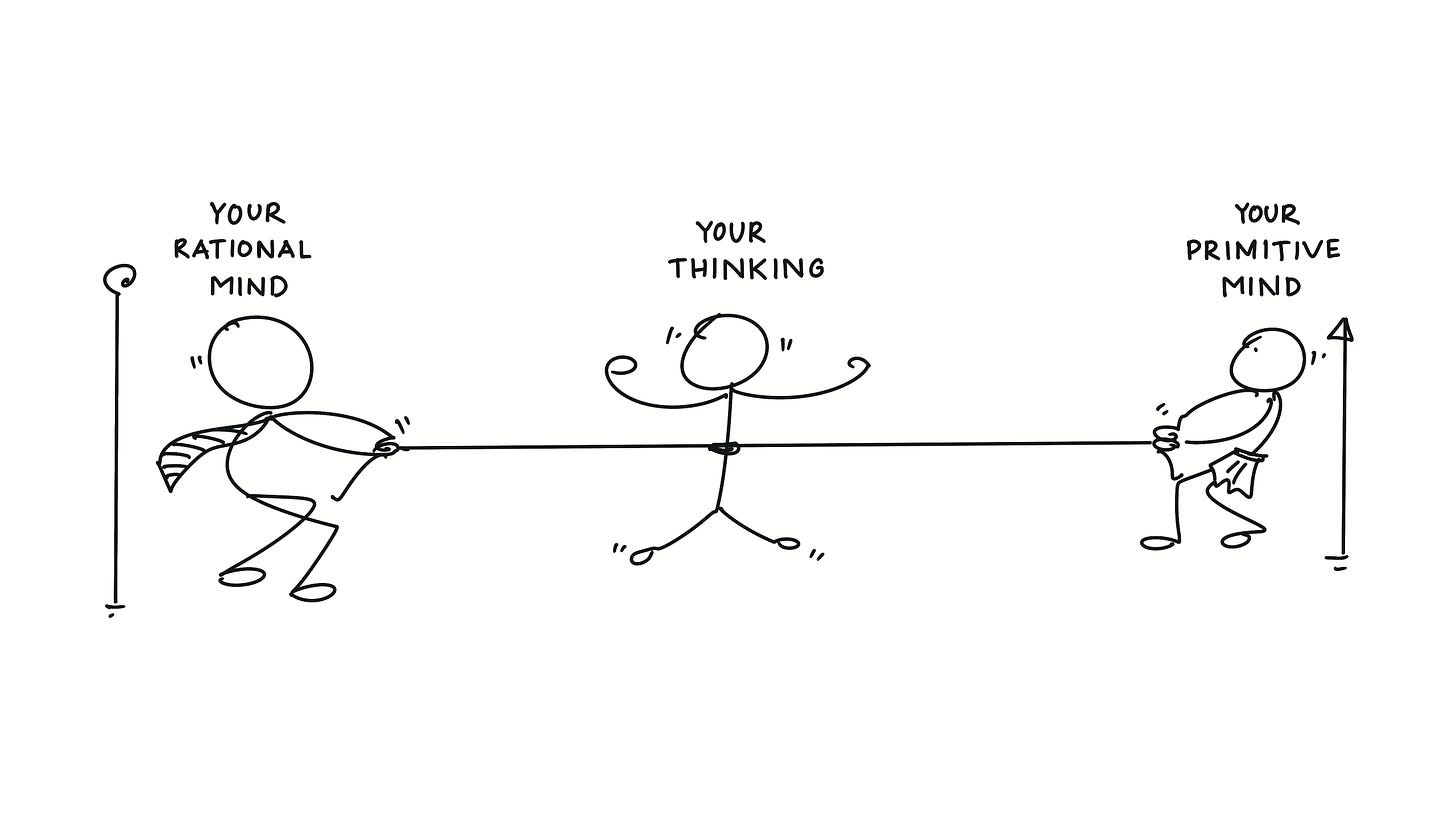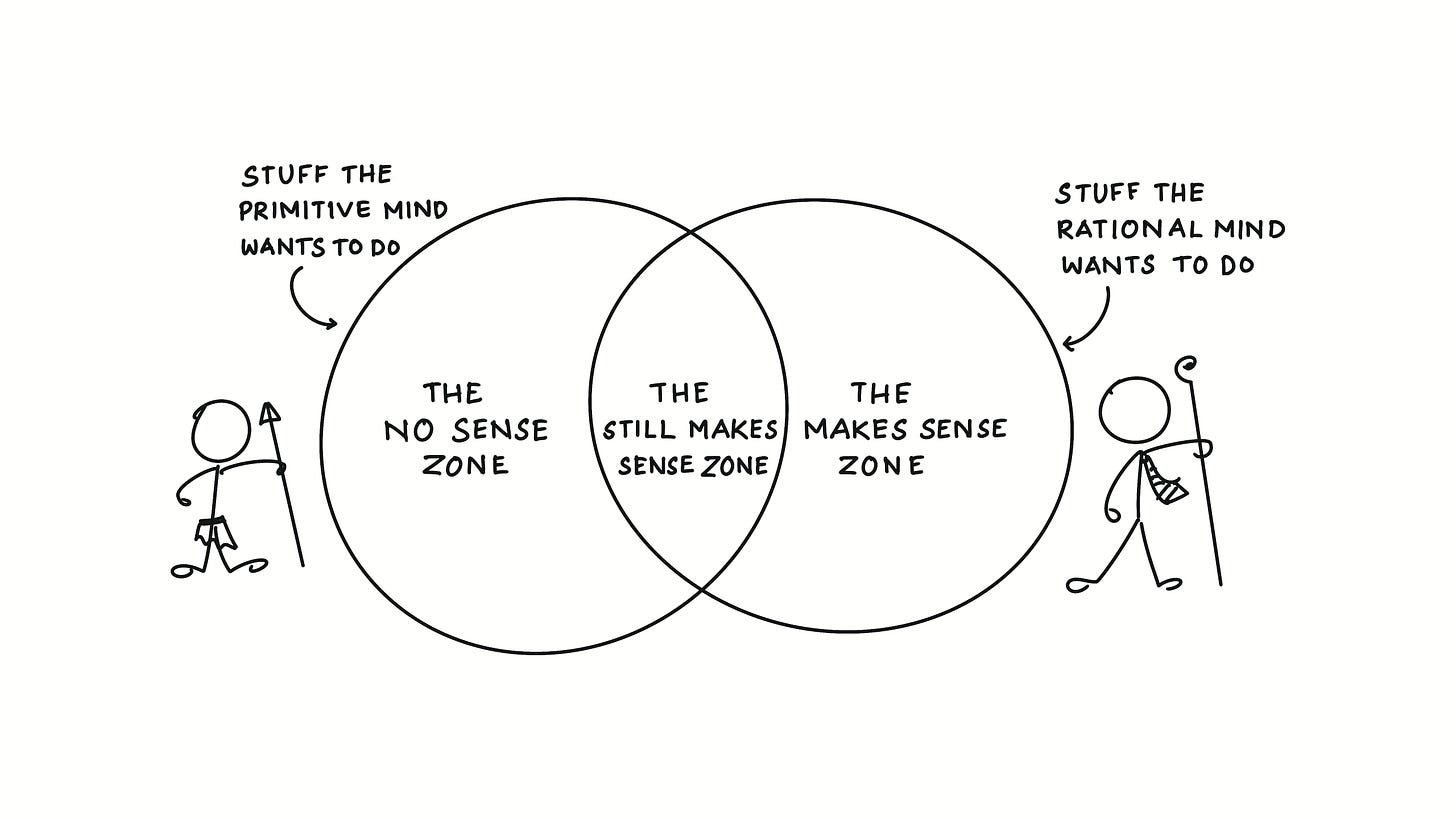A Framework to Understand Human Stupidity
Or, the tug-of-war between the Primitive Mind and the Rational Mind
👋 Hey there! My name is Abhishek. Welcome to a new edition of The Sunday Wisdom! This is the best way to learn new things with the least amount of effort.
It’s a collection of weekly essays on a variety of topics, such as psychology, health, science, philosophy, economics, business, and more — all varied enough to turn you into a polymath. 🧠
The latest two editions are always free, the rest are available to paid subscribers.
Now, on to this week’s essay.
In a similar fashion to last week, we’ll explore some of the key learnings from Tim Urban’s book, What’s Our Problem? this week as well. But unlike last week, instead of exploring societal psychology, we’ll do a deep dive into human thinking. We’ll especially try to understand why, despite being sane and rational, we sometimes act stupid.
This is the first part of a two-part essay and is about 850 words.
Q: Why do perfectly rational people sometimes act stupid?
Philosophers and scientists have been grappling with the “multiple minds” idea for millennia. Plato wrote about a “charioteer” (intellect) that manages the “horses” of rational modesty and passionate insolence.
Sigmund Freud’s structure consisted of the “id” (primitive instinct), the “superego” (the conscience), and the “ego” that balances the two with external reality and mitigates rows between them.
More recently, social psychologist Jonathan Haidt wrote about the emotional “elephant” and its rational “rider” in The Happiness Hypothesis. The rider “appears” to be in control, but it’s far from reality. The elephant has got its own thing going.
But the most compelling framework (at least, according to me) of how the mind works is by psychologist and Nobel laureate Daniel Kahneman.
In Thinking, Fast and Slow, Kahneman breaks down the brain into two parts: System 1 and System 2. System 1 is the part of the brain that handles the simple things: sensory input, automatic and unimportant decisions, casual social interactions, etc., while System 2 is the higher-order, logical part of the brain that brings processing power for decisions and problems that require deeper thought.
Then there’s the triune brain model that divides the brain into the following three main components:
Although the triune brain is not an accurate representation of the brain’s actual organisation, we’ll use it as a framework to understand the conflict between the two (conceptual) parts of the brain — the Rational Mind (the Neocortex) and the Primitive Mind (the Reptilian Brain and the Limbic System).
But… before we get on with that, let’s cover some basics.
The Rational Mind is the part of you that can think outside itself and self-reflect and get wiser with experience; while the Primitive Mind is a collection of innate survival instructions that’s optimised for one thing and one thing only — pass on your genes.
While the Rational Mind seeks to be aware of delusions, the Primitive Mind likes to hold onto beliefs that promote survival behaviours, regardless of their truthfulness. These beliefs are often established early in life based on societal influences.
Your thinking falls into a spectrum between rational thinking and primitive thinking.
There’s a constant tug-of-war that goes on, and based on who has the stronger pull, your thinking shifts towards one side or the other.
When things are going well, the inside of your head looks like this:
The Rational Mind is large and in charge, while its little unruly pet chases dopamine around, taking care of the eating, sleeping, and masturbating.
The Rational Mind is usually onboard with the Primitive Mind’s goals as long as it maps onto reality and keeps you within the “Makes Sense Zone” or “Still Makes Sense Zone” as shown here:
But whenever you find yourself procrastinating even though you’ve got something important to do; or whenever you find yourself hogging down fried and processed stuff even though you know you shouldn’t, your Primitive Mind has hijacked the cockpit of your brain.
As smart as the Rational Mind may be, it’s not very good at managing the Primitive Mind. And when the Primitive Mind gains too much control, you might find yourself drifting over to the “No Sense Zone”.
This constant tug-of-war can be simplified into the following four states:
Follow the arrows and you’ll see as the Primitive Mind gets stronger and stronger, the Rational Mind loses its edge, until the unruly pet becomes the new ruler and completely takes over your mind.
It’s important to note that when the Rational Mind is winning the tug-of-war, it’s very much aware of the Primitive Mind and what it’s up to. The Rational Mind understands that primitive pleasures such as sex, food, and all-in-good-fun tribalism like sports fandom are enjoyable and often necessary parts of a human life.
Thus, like a good pet owner, the Rational Mind is more than happy to let the Primitive Mind have its fun — as long as it’s in moderation, for the right reasons, and not hurting anyone.
But when something riles up the Primitive Mind, it starts getting bigger and stronger. This dulls our consciousness, so when we’re most under the spell of the Primitive Mind, we don’t even realise it’s happening.
After losing control and unable to think clearly anymore, the Rational Mind begins directing its efforts toward supporting whatever the Primitive Mind wants to do, whether it makes sense or not.
This gradual decline in the quality of our thinking as the Primitive Mind takes over the brain can be visualised as a descent along the rungs of the Ladder of Thinking.
When we’re up on the high rungs, we act like grownups. But when we slip down to the low rungs, we’re short-sighted and small-minded, thinking and acting with our pettiest emotions. We’re low on self-awareness and high on hypocrisy. We’re our worst selves.
Before You Go…
If you’re finding this newsletter valuable, share it with a friend. Also, consider subscribing. If you aren’t ready to become a paid subscriber yet, you can also give a tip by buying me a coffee. ☕️
I’ll see you next Sunday,
Abhishek 👋
PS: All typos are intentional and I take no responsibility whatsoever! 😬















